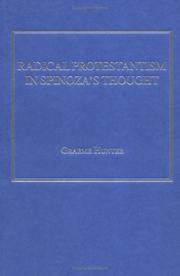| Listing 1 - 5 of 5 |
Sort by
|
Book
ISBN: 9055736392 Year: 2005 Publisher: Budel Damon
Abstract | Keywords | Export | Availability | Bookmark
 Loading...
Loading...Choose an application
- Reference Manager
- EndNote
- RefWorks (Direct export to RefWorks)
Spinoza, Baruch --- Antiquity --- Spinoza, Benedictus de, --- Classical influences. --- Spinoza, Benedictus de --- Classical influences --- Ispīnūzā, --- Spinoza, Baruch, --- Espinoza, Baruch d', --- Sbīnūzā, --- Espinosa, Baruch de, --- De Spinoza, Benedictus, --- Shpinozah, --- Shpinozah, Barukh, --- Spinoza, Benedict de, --- Spinoza, Barukh, --- Spinoza, Baruch de, --- Spinoza, Benoît de, --- ספינאזא, ברוך דע --- ספינאזא, ברוך, --- שפימוזה, ברוך --- שפינאזא, בענעדיקט --- שפינאזא, ברוך --- שפינאזע, ברוך --- שפינוזא, בנדיקטוס --- שפינוזהת ברוך, --- שפינוזה, ברוך --- שפינוזה, ברוך די, --- שפינוזה, ברוך, --- שפינוזה, ב. --- سبينوزا، بندكتس --- de Spinoza, Benedictus --- Spinoza, Benedict de

ISBN: 0199279543 9780199279531 9780199279548 0199279535 Year: 2005
Abstract | Keywords | Export | Availability | Bookmark
 Loading...
Loading...Choose an application
- Reference Manager
- EndNote
- RefWorks (Direct export to RefWorks)
"Stuart Hampshire, one of the most eminent British philosophers of the twentieth century, will perhaps be best remembered for his work on the seventeenth-century philosopher Spinoza, nearly all of which is gathered now in this volume. Among the great thinkers of modern times, only Spinoza created a complete system of philosophy that rivals Plato's. Few other thinkers have felt so strongly 'the desire to have a unitary view of the world and of man's place within it' - a desire that led Spinoza to make crucial contributions to every major philosophical topic: the nature of knowledge and freedom, the existence of God, ethics and politics, mind and matter, pleasure and perception." "Hampshire's classic 1951 introductory book Spinoza pioneered the revival of interest in him in the English-speaking world. It remains the best introduction, and it is reprinted here in its revised edition. But what gives particular interest to this new volume is the first publication of Hampshire's last work 'Spinoza and Spinozism', an extended presentation of a Spinozist philosophical worldview. To complete the picture, Hampshire's influential 1962 essay, 'Spinoza and the Idea of Freedom' is also included."
Spinoza, Benedictus de, --- Ispīnūzā, --- Spinoza, Baruch, --- Espinoza, Baruch d', --- Sbīnūzā, --- Espinosa, Baruch de, --- De Spinoza, Benedictus, --- Shpinozah, --- Shpinozah, Barukh, --- Spinoza, Benedict de, --- Spinoza, Barukh, --- Spinoza, Baruch de, --- Spinoza, Benoît de, --- ספינאזא, ברוך דע --- ספינאזא, ברוך, --- שפימוזה, ברוך --- שפינאזא, בענעדיקט --- שפינאזא, ברוך --- שפינאזע, ברוך --- שפינוזא, בנדיקטוס --- שפינוזהת ברוך, --- שפינוזה, ברוך --- שפינוזה, ברוך די, --- שפינוזה, ברוך, --- שפינוזה, ב. --- سبينوزا، بندكتس --- Spinoza, Benedictus de --- Criticism and interpretation --- de Spinoza, Benedictus --- Spinoza, Benedictus de, - 1632-1677. --- Spinoza, Baruch --- Spinoza, Benedict de

ISBN: 9004149465 9047416368 Year: 2005 Volume: 137 Publisher: Leiden ; Boston : Brill,
Abstract | Keywords | Export | Availability | Bookmark
 Loading...
Loading...Choose an application
- Reference Manager
- EndNote
- RefWorks (Direct export to RefWorks)
This is the first collection of Spinoza studies that deals exclusively with the language, style, and the transmission and editing of his texts. It includes investigations into the authorship of some minor texts, Spinoza’s Latinity, the Hebrew passages in the Tractatus theologico-politicus , his way of handling quotations and his use of the first person singular. It contains a full concordance of the Tractatus de intellectus emendatione , an inventory of the copies of Spinoza’s Posthumous Works in the Netherlands and an account of the editions produced in the nineteenth century. In addition, there are essays on the life and thought of Spinoza’s publisher Jan Rieuwertsz, on the question of who printed his books, and on principles and choices in editing. Contributors include: Fokke Akkerman, Wout Jac. van Bekkum, Michelle Beyssade, Eugenio Canone, Johan Gerritsen, Iiro Kajanto, Jelle Kingma, Jacqueline Lagrée, J.H. Leopold, Clasina G. Manusov-Verhage, Filippo Mignini, Pierre-François Moreau, H.J.M. Nellen, Michael John Petry, Esmée Schilte, Hans Gerhard Senger, Piet Steenbakkers, Pina Totaro, and J.J.V.M. de Vet.
Spinoza, Benedictus de, --- Ispīnūzā, --- Spinoza, Baruch, --- Espinoza, Baruch d', --- Sbīnūzā, --- Espinosa, Baruch de, --- De Spinoza, Benedictus, --- Shpinozah, --- Shpinozah, Barukh, --- Spinoza, Benedict de, --- Spinoza, Barukh, --- Spinoza, Baruch de, --- Spinoza, Benoît de, --- ספינאזא, ברוך דע --- ספינאזא, ברוך, --- שפימוזה, ברוך --- שפינאזא, בענעדיקט --- שפינאזא, ברוך --- שפינאזע, ברוך --- שפינוזא, בנדיקטוס --- שפינוזהת ברוך, --- שפינוזה, ברוך --- שפינוזה, ברוך די, --- שפינוזה, ברוך, --- שפינוזה, ב. --- سبينوزا، بندكتس --- Language. --- Spinoza, Benedictus de --- Language --- de Spinoza, Benedictus --- Spinoza, Baruch --- Spinoza, Benedict de
Book
ISSN: 1255183X ISBN: 9782859445379 2859445374 2859448063 Year: 2005 Volume: 14 Publisher: Éditions de la Sorbonne
Abstract | Keywords | Export | Availability | Bookmark
 Loading...
Loading...Choose an application
- Reference Manager
- EndNote
- RefWorks (Direct export to RefWorks)
L'ouvrage explore les diverses facettes physiques, mentales et psychophysiques de la puissance d'agir chez Spinoza, de la peur de la mort qui en constitue le plus bas degré à la jouissance de l'éternité qui en est l'acmé. À travers une série de variations regroupées autour de quatre principaux thèmes — l'éternité de l'esprit, la positivité du faux, Spinoza dans le temps, corps et affects — il s'agit de ressaisir la puissance dans l'impuissance, la fortitude dans la finitude, et d'exprimer la positivité du négatif en allant chercher la puissance là où l'on ne s'attendrait pas à la trouver. Les trois premières parties examinent la puissance mentale qui culmine avec la conscience de l'éternité de l'entendement, mais qui se manifeste aussi bien à travers la persistance d'un noyau de positivité au sein même des notions confuses et des idées inadéquates, comme le bien et le mal, qu'à travers la permanence de ce que l'on pourrait appeler l'esprit du spinozisme dans le temps. À ces expressions mentales de la puissance d'agir font pendant les variations physiques et psychophysiques de la quatrième partie où sont analysées, d'une part, les capacités du corps et son aptitude à se faire reconnaître comme humain en lui-même et par lui-même, et d'autre part, les modifications affectives de la puissance d'agir, de la mort à l'amour, de la servitude passionnelle à la fortitude retrouvée.
Power (Philosophy) --- Pouvoir (Morale) --- Spinoza, Benedictus de, --- Philosophy & Religion --- Philosophy --- Ispīnūzā, --- Spinoza, Baruch, --- Espinoza, Baruch d', --- Sbīnūzā, --- Espinosa, Baruch de, --- De Spinoza, Benedictus, --- Shpinozah, --- Shpinozah, Barukh, --- Spinoza, Benedict de, --- Spinoza, Barukh, --- Spinoza, Baruch de, --- Spinoza, Benoît de, --- ספינאזא, ברוך דע --- ספינאזא, ברוך, --- שפימוזה, ברוך --- שפינאזא, בענעדיקט --- שפינאזא, ברוך --- שפינאזע, ברוך --- שפינוזא, בנדיקטוס --- שפינוזהת ברוך, --- שפינוזה, ברוך --- שפינוזה, ברוך די, --- שפינוזה, ברוך, --- שפינוזה, ב. --- سبينوزا، بندكتس --- de Spinoza, Benedictus --- Baruch Spinoza --- esprit --- corps --- Spinoza, Benedictus de --- Spinoza, Baruch --- Spinoza, Benedict de --- Spinoza, baruch (1632-1677)

ISBN: 075460375X Year: 2005 Publisher: Aldershot Ashgate
Abstract | Keywords | Export | Availability | Bookmark
 Loading...
Loading...Choose an application
- Reference Manager
- EndNote
- RefWorks (Direct export to RefWorks)
Christian church history --- Spinoza, Baruch --- Philosophy and religion --- Christianity and philosophy --- Religion and philosophy --- Religion --- Protestantism. --- Spinoza, Benedictus de, --- Ispīnūzā, --- Spinoza, Baruch, --- Espinoza, Baruch d', --- Sbīnūzā, --- Espinosa, Baruch de, --- De Spinoza, Benedictus, --- Shpinozah, --- Shpinozah, Barukh, --- Spinoza, Benedict de, --- Spinoza, Barukh, --- Spinoza, Baruch de, --- Spinoza, Benoît de, --- ספינאזא, ברוך דע --- ספינאזא, ברוך, --- שפימוזה, ברוך --- שפינאזא, בענעדיקט --- שפינאזא, ברוך --- שפינאזע, ברוך --- שפינוזא, בנדיקטוס --- שפינוזהת ברוך, --- שפינוזה, ברוך --- שפינוזה, ברוך די, --- שפינוזה, ברוך, --- שפינוזה, ב. --- سبينوزا، بندكتس --- Religion. --- de Spinoza, Benedictus --- Spinoza, Benedictus de --- Spinoza, Benedict de
| Listing 1 - 5 of 5 |
Sort by
|

 Search
Search Feedback
Feedback About UniCat
About UniCat  Help
Help News
News